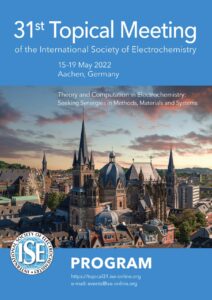31st Topical Meeting of the International Society of Electrochemistry
15-19 May 2022, Aachen, Germany
Theory and Computation in Electrochemistry: Seeking Synergies in Methods, Materials and Systems
Description of Event
Theory and computation in electrochemistry have reached a level, on which they coexist with experiment on an equal footing in many areas. The intention was for the 31st Topical Meeting of the International Society of Electrochemistry to provide a forum for a vibrant cross-disciplinary exchange along established and emerging directions in physical theory, computational electrochemistry, and continuum modeling. The meeting program covered topics from fundamental challenges in electrochemistry to practical challenges in the production or removal of chemicals, energy conversion and storage, sensing, and electronic and photonic (meta-)materials. Contributions embraced spatial scales from atomic to electrode level, and temporal scales from surface reactions to aging and degradation. Following a 2012 topical meeting with a focus on theory and computation in electrochemistry, a meeting with the same focus in 2022 was overdue.
Report
Session topics covered molecular electrochemical processes at surfaces including charge storage and transfer, reactions and surface changes; surface charging, transport and interfacial kinetics in nanopores and heterogeneous media; self-assembly and emergence of structure vs. property relations in random heterogeneous materials (e.g., colloids, porous media, composites) for simultaneous reactant diffusion, ion transport, and charge transfer; interplay of functional components and processes in or at electrodes for various application areas. Any of these topics offers tremendous room for discovery and innovation through theory, modelling and simulation. The meeting program was designed to bring out the synergies among these topics.
Even though centred on theory and computation, the meeting was attended as well by a sizable number of experimentalists in electrochemistry. The oral presentation program and poster sessions provided ample opportunity for vivid exchange among scientists involved in theory, simulation and experimental research on tuning structure and properties of electrochemical materials (electrocatalysts, ionic media, complex electrodes); unravelling intricate structure vs. property relations through concerted use of theory, simulation, spectroscopy, microscopy, imaging, and electrochemical measurements; devising new methodologies for in-operando testing and analytics; and tweaking the life-cycle performance of materials under use. The theme of materials data handling and virtual materials intelligence that is rapidly gaining attention and momentum in the community featured prominently in one of the sessions.
The session plan was arranged in such a way that fundamentally and methodically oriented topics were placed at the beginning, with sessions on “Modeling functional materials: microstructure to complex electrodes” (S3) and “Advances in first principles electrochemical methods” (S1) scheduled on Monday and the session on “Advances in first principles electrochemical methods” (S2) scheduled on Tuesday. Sessions with higher relevance to applications in functional (engineering) materials and electrochemical energy technology were scheduled on Wednesday, i.e., “Modeling dynamic phenomena in electrochemical systems” (S4) and “Accelerated materials development: rapid path from idea to integration” (S5), and on Thursday, “Modeling-based diagnostics of electrochemical materials and cells”. A total number of 65 presentations was given in these sessions, including an opening plenary lecture by Prof. Marc T. M. Koper from Leiden University that was presented during the opening ceremony on Sunday night. Each of the 4 days of the conference started with a keynote talk. There were 8 further invited talks. In addition, 76 posters were presented, distributed over 4 sessions. Eight poster prizes were awarded among 48 posters presented by Ph.D. students.
The total number of registered attendees was 170. Among these, 86 students (predominantly PhD students) were participating. Participants from 25 countries attended the meeting. 78 participants were from Germany, 60 participants were from other EU member states and Switzerland; and 32 were from North-America and Asia. 33 attendees were female.
Organizers
Prof. Dr. Michael Eikerling, RWTH Aachen Universität and Forschungszentrum Jülich
Prof. Dr. Ulrike Krewer, Karlsruhe Institute of Technology
Prof. Dr. Axel Groß, Universität Ulm
Prof. Dr. Katharina Krischer, Technische Universität München
Prof. Dr. Eckhard Spohr, Universität Duisburg-Essen
Prof. Dr. Birger Horstmann, DLR Stuttgart
Prof. Dr. Fabio La Manta, Universität Bremen
Prof. Dr. Mathieu Salanne, Sorbonne Université
Prof. Dr. Jun Cheng, Xiamen University
Prof. Dr. Jan Rossmeisl, University of Copenhagen
Detailed Program
The detailed program including talk titles and the list of speakers and poster presenters can be found here:
https://topical31.ise-online.org/ISE-TM31-PROGRAM_Web.pdf
Conclusions and prospects
The meeting brought together established experts, a large contingent of young aspiring scientists and students from around the world. Their educational backgrounds span from theoretical physics, physical chemistry, materials chemistry, to electrochemical engineering. The common thread throughout all sessions was the focus on theory, modelling and simulation, as the means to (i) uncover, explore and rationalize fundamental electrochemical phenomena that determine local reaction conditions, capacitive charging phenomena, and interfacial electrochemical kinetics, (ii) determine relations between structure and effective properties of important classes of electrochemical materials, and (iii) determine the lifetime-performance behaviour of electrochemical devices such as fuel cells, batteries or electrolysis cells that are crucial for the clean energy transition.
The conference program was comprehensive and balanced in terms of specific materials classes and complex electrochemical media and systems that were discussed, including electrocatalytic materials, ionic media, various configurations of solid-electrolyte interfaces, porous composite electrodes, and device lay-outs. The vivid cross-exchange of experts with different backgrounds, scientific motivation, and focus on materials and technology challenges created new understanding of electrochemical phenomena and ideas for the design of materials, which have their structure and properties tuned to specific functions as required in charge storage media, electrocatalytically active media, or electrochemical sensors. These scientific exchanges included experimental electrochemists, materials scientists and engineers, who expect theory, modelling and simulation to guide the development of electrochemical materials and devices for technology sectors of high socio-economic importance. In particular, accelerating the clean energy transition hinges on path-breaking advances in the design and integration of highly-performing, long-lasting and affordable electrochemical materials. These advances will be impossible to achieve without major contributions from theory, modelling and simulation.
We would like to thank our sponsors: Forschungszentrum Jülich, Cluster of Excellence POLiS (Post Lithium Storage), German Science Foundation (DFG), Psi-k

